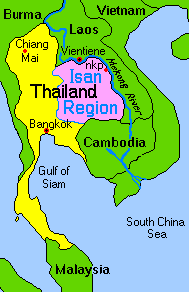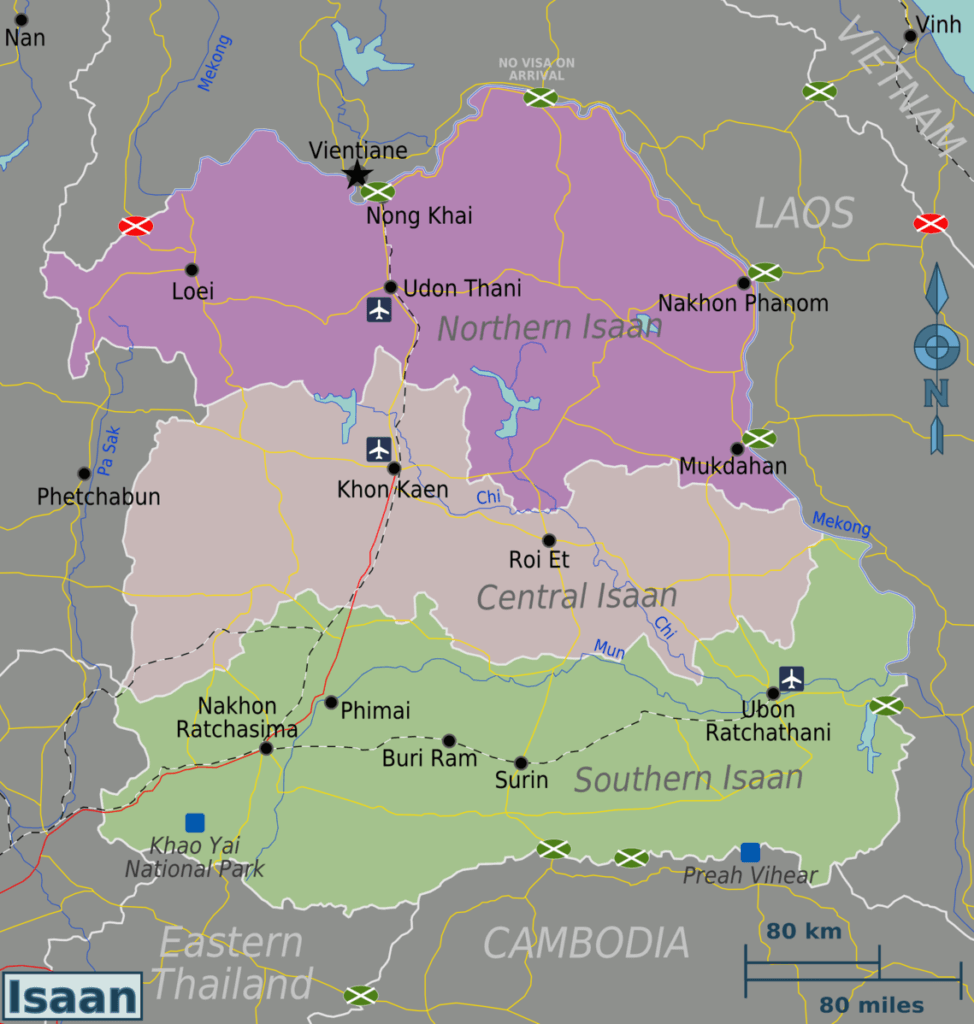Northeastern region of Thailand or what Thai people refer to as ‘อีสาน Isan also Isaan, Isarn, Esan, or Esarn’ is the largest part of the country. You might hear the official term is “ภาคตะวันออกเฉียงเหนือ pàak dtà-wan-àwk-chǐang-nŭea”.
The main language is Isan, which is a dialect of the Lao language. Isan belongs to the Chiang Saeng and Lao–Phutai language groups, which along with Thai are members of the Tai languages of the Tai–Kadai language family.
Thai is also spoken by almost everyone and is the language used in education. Khmer, the language of Cambodia, is widely spoken in areas along the Cambodian border: Buriram, Surin, and Sisaket.
(Source: Wikipedia)
Teacher Pear is from Maha Sarakham province (จังหวัดมหาสารคาม), one of the 77 provinces of Thailand, located in the northeastern region of Thailand. Neighbouring provinces are (from north clockwise) Kalasin, Roi Et, Surin, Buriram, and Khon Kaen. It is the home of Mahasarakham University, the largest university in northeast Thailand.
Most of the workers in Bangkok such as taxi drivers, servers, street sellers are from Isan region. We think if you have some basic knowledge about Isan dialect, it could be fun for you to express a small Isan conversation with people you are likely to encounter.
This lesson teacher Pear is teaching basic words, phrases and sentences from Isan dialect. If you already have basic ideas of central Thai dialect, learning Isan should be easy, you only need to learn new vocabulary while the structure of the language remains the same.
We hope you find this lesson useful and enjoyable. 🙂
Below are phrases and sentences we talk about in the video:
- ข่อย /kàwi/ = I (for both male and female speakers)
- เจ้า /jâo/ = you
- ข่อยมักเจ้า /kàwi mák jâo/ = I like you
- ข่อยฮักเจ้า /kàwi hák jâo/ = I love you
- เป็นตาฮัก /bpen-dtaa-hák/ = lovely, pretty, adorable
- เจ้าเป็นตาฮักแถะ /jâo bpen-dtaa-hák tàe/ = You are lovely.
- แซ่บ /sâeb/ = delicious
- แซ่บบักคัก /sâeb bàk-kák/ = very delicious
- ขอบคุณหลายๆ /kàwp-kun lăai-lăai/ or ขอบคุณหลายๆเด้อ /kàwp-kun lăai-lăai dêr/ = thank you very much
- คิดฮอด /kít-hâwd/ = miss someone
- ข่อยคิดฮอดเจ้าเด้อ /kàwi kít-hâwd jâo dêr/ = I miss you
- แมน /maen / = correct, right
- บ่ /bàw/ = not
- แมนบ่ /maen bàw/? = Is that right?
- มักบ่ /mák bàw/ ? = Do you like it?
- เจ้ามักอาหารไทยบ่ /jâo mák aa-hăan tai bàw/? = Do you like Thai food?
- อิหยัง /ì-yăng/? = What?
- อยู่ไส /yùu săi/? = Where?
- จังได๋ /jang dăi/? = How?
- ตอนใด๋ /dtawn dăi/? = When?
- เป็นหยัง /bpen yăng/? = Why?
- ไผ /păi/? = Who?
What do you like eat? = เจ้ามักกินอิหยัง /jâo mák gin ì-yăng?/
I like to eat Pad Thai. = ข่อยมักกินผัดไท /kàwi mák gin pàd-tai/
Where is your house? / Where do you live? = บ้านอยู่ไส /bâan yùu săi?/
Where are you going? = เจ้าไปไส /jâo bpai săi?/
How do you go? = ไปจังใด๋ /bpai jang dăi?/
When will you come to Thailand? = เจ้าสิมาประเทศไทยตอนใด๋ /jâo sì maa bprà-têed-tai dtawn dăi?/
สิ /sì/ = will, going to
Why don’t you come? = เป็นหยังบ่มา /bpen-yăng bàw maa?/
Who did you eat with? = กินเข่ากับไผ /gin kào gàp păi?/


Thanks for the lessons, very useful! But it seems there are so many different dialects within Isan, Sakon Nakhon /Ban Muang Phu Tai is definitely not the same!
Thank you very much khun Mod and khun Pear,
for this excellent lession. I have a lot of fun.
I go already 3 years to school and learn thai and now i learn
a little bit paasaa iisaan
Thank you again
Willi from Germany
Thank you Kruu Mod and Kruu Pear.
Thank you very much for these Isan lessons. I am motivated to learn Isan because my wife is from Udon Thani Province and speaks Isan as her native dialect. None of the language schools in Udon teach Isan so your online lessons are really useful. For your next Isan lesson, I would suggest something around the situation of meeting a stranger on the street and asking directions. Another idea would be a lesson based upon popular Isan songs.
Thank you for comment. We are happy to hear that you found our lessons useful in your learning. We have the second lesson on Isan dialect here: https://learnthaiwithmod.com/2017/12/video-isan-dialect-lesson-2/
Also thank you for your suggestion. It is a good idea. We will do more videos on Isan dialect in the future. 🙂
I really want to learn your language, im Nam , Im Thai people from Viet nam.
Hi Nam, thank you for visiting my website. we offer private lessons via Skype you can start learning Thai from wherever you are. Please find more detials here: https://learnthaiwithmod.com/skype-training/
Anyone wondering why, so far, only men have responded here? How about you, Mod? It’s sad, so sad.
Hi Mod,
I was so happy that I can learn isaan from your video isaan 101, this video is very useful and wonderful, i really hope can learn isaan from you again, hope to see or receive your second isaan 101 video.
Yeah 😁
Kru Mod,
Can you tell me what “mah da sai” as a question means in issan dialect?
Thank You,
Art
I am sorry I have no idea because I don’t speak Isaan dialect. I will ask Kru Pear about this.
Where are you from
Teacher Pear is from Maha Sarakham. It is in the northeastern Thailand. I am from Nakhon Si Thammarat a province in Southern Thailand.
Hi kru mod, great lesson. What does “mah da sai” mean. Do not know Thai spelling. I was out walking in Udon and someone asked me, ‘mah da sai’
I am note sure about this sentence without hearing it or reading it in Thai. I assume it could be “มาจากไส maa jàak săi” which means “where are you from?” or “where did you come from?”.
What an extremely helpful video! Heading from Chiang Mai to Isan this weekend. Going to try to communicate better! Thank you.
Thank you for your kind comment. I hope you had a great time in Isan. 🙂
I live in isan so this is great give me more please
Jao can also be used as a polite particle like khrap and ka, no? I always hear the ladies at the coffee shop by my condo say: Sawasdee Jao or Khorp khun jao. The coffee shop is based on Chiang Mai theme.
“jao” is used as a polite particle in Northern Thailand. One word is used for two different meanings in Isan and Northern dialect. 🙂
And what pert of Thailand are you originally from Krue Mod?? I might guess Lopburi or Phitsonoluk ??? ^-^
Thanks, the lesson was NA SONG JAI MAAK !! Krop koon lai lai
You almost got it correct. My mother is from Nakhon Si Thammarat in the South and my father is from Pichit which is located next to Phitsanulok. I was born in Bangkok but grew up in Nakhon Si Thammarat, then moved to Bangkok and has been living here since 18. 🙂
Really good to understand i have been living in so isaan sakon nakon for 2 weeks so i will need to speal thai……..
is isan grammar and thai grammar are same?
Yes, the grammar are the same. 🙂
Mod this is a great idea to teach Thai online, thank you (kop kun krap)
Many thanks for this useful lesson
Please could you learn us more about Issan langage
for example : in the street , at school , at the restaurant…
because i cannot find an Issan langage book
Do you know one ?
Yours truly
Wow, thanks. I was learning basic Thai and was wondering why different words were being used. Your video was Very Informative !! Thank you so much.
I will be in Udon Thani and Ban Muang in a few weeks from now.